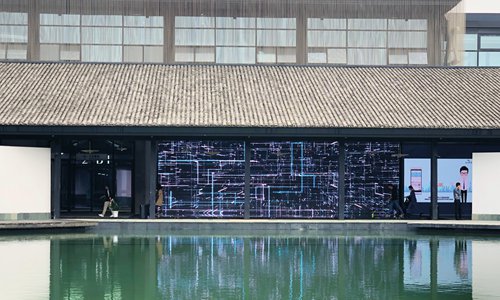HOME >> BUSINESS
AI finds way amid US crackdown
By Zhang Hongpei in Wuzhen Source:Global Times Published: 2019/10/21 22:33:40
Closer integration with real economy needed

A digital screen shows the latest embrace of Wuzhen with the internet during the World Internet Conference held in the river town on Monday. Photo: Zhang Hongpei/GT
China should maintain its advantages in developing the artificial intelligence (AI) sector such as giving full play to market participants while ramping up efforts at the basic technology level to achieve genuine independence amid the US' crackdown, senior executives and experts told the Global Times on Monday.
"The US sanctions are having a limited impact on our company because we bought some components and adjusted the production process in advance," Hu Yu, rotating president of iFlytek, a Chinese AI-powered speech recognition leader, told the Global Times in an exclusive interview during the World Internet Conference (WIC), which kicked off on Sunday in Wuzhen, East China's Zhejiang Province. "We have some measures in hand," said Hu.
Since Huawei was banned by the US in May this year, most Chinese technology companies have been making preparations both mentally and physically, he noted.
The US Commerce Department put eight Chinese companies on its "Entity List" in early October, which focused on facial-recognition and AI technology including Hikvision, Megvii Technology, iFlytek Co and SenseTime. The US move prevents the Chinese entities from buying US products.
"The schedule of entering the US market might be affected to some degree due to the US move, but we still hope that our translators can reach to the US consumers," Hu noted.
In its latest response, Hikvision, the Zhejiang-based surveillance product maker, said that most of its US suppliers have gradually resumed deliveries on the condition of complying with the US export control regulations, according to media reports on Monday.
The company said it is confident in facing the challenges brought by the US sanctions, given its business scale and cash flow.
Hikvision reported a 17.86-percent increase in revenue to 39.84 billion yuan ($5.63 billion) in the first three quarters, according to its filings. Net profit rose 8.54 percent to 8 billion yuan. It forecast the full year's net profit would be up 5-20 percent.
The Shenzhen-listed company's shares went up 3.84 percent to close at 31.61 yuan on Monday.
Key battleground
As a key next-generation technology, AI has become a crucial battleground for the world's internet powers including China and the US.
Luo Guojie, executive director at the Center for Energy-efficient Computing and Applications of Peking University, told the Global Times on Monday on the sidelines of the WIC that the US' blacklist is intended to contain China's economic and technological development as AI can become a robust driver of economic growth if applied in an appropriate way.
"Looking ahead, China should firmly seize the huge market, a definite advantage, in its hand. In the meanwhile, the nation's academic and administrative organizations should clarify the AI technology roadmap and set priorities," Luo noted.
"After the hype of previous years, partially due to hot money flowing in, China's AI industry has cooled down and entered a rational development phase. Meanwhile, 5G networks have also brought opportunities for further advancement of AI technologies," said Hu.
During an AI-related panel held on Monday, Vice Minister of Industry and Information Technology Chen
Zhaoxiong said that China's AI sector is flourishing with many fast-growing, vibrant companies, and its integration with the real economy is deepening.
As of June, there were more than 1,200 AI enterprises in China, ranking second in the world, said Chen. The US still holds the top spot in the area.
"We should have an open mind to continue business cooperation with international partners despite current geopolitical obstacles," said Hu.
Hu stressed the significance of building up independence by innovation and research, especially when others are trying to politicize things.
Faced with the China-US trade tensions, which have permeated the technology sector and may last for quite some time, Hu said domestic companies should stand together in finding business solutions and forging advantages in the international market.
The State Council, China's cabinet, issued a guideline on developing AI in 2017, setting a goal of becoming a global innovation center in this field by 2030. Developing AI is a "complicated and systematic project," according to the guideline.